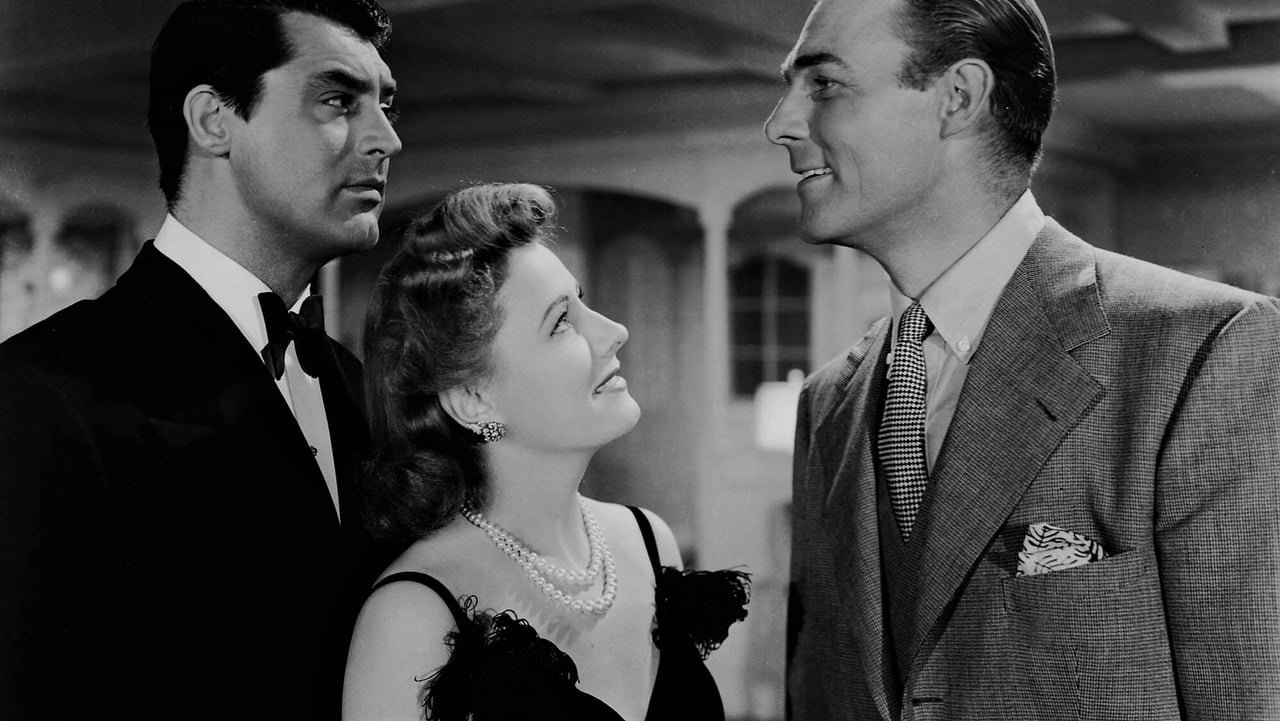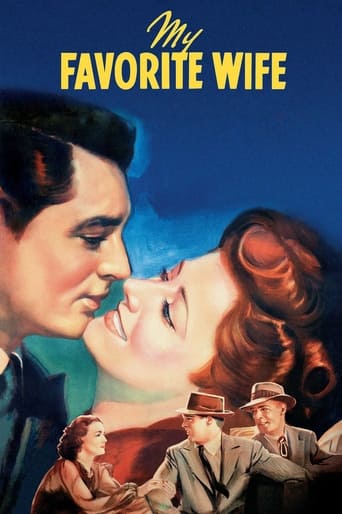



Wow! Such a good movie.
Just perfect...
Highly Overrated But Still Good
Very interesting film. Was caught on the premise when seeing the trailer but unsure as to what the outcome would be for the showing. As it turns out, it was a very good film.
View MoreLawyer Nick Arden (Cary Grant) has just remarried when his first wife Ellen (Irene Dunne) returns from presumed death by shipwreck seven years earlier. Not even her children recognise her, and in the meantime she has been declared legally dead and the life insurance has paid out.This is a decent enough film and if you are a Cary Grant or Irene Dunne fan you will want to see it. There are not as many screwball laughs as there might have been, the character's motivations are not quite plausible and the plot is a bit lumpy but it is really quite enjoyable.Remade as 'Move over, Darling' in 1963, whether you will prefer this version probably depends on whether you like your movies with the flavour of the 1940s or the 1960s.I give it (in the context of the time) an 8/10.
View MoreWhile Columbia Pictures was releasing its comedy-romance, "Too Many Husbands," a crew and cast at RKO were about to start filming this movie. But the RKO writers had come up with a different approach to an age-old plot. Instead of a husband being lost at sea and presumed dead, "My Favorite Wife" begins with a wife lost at sea and presumed dead. And, instead of the husband returning just as or after the wife remarries, here the wife returns just as her husband gets married again. Either scenario makes for great comedy and entertainment. These two films were released just a couple of months apart in 1940, and both had stellar casts. They both were successful, but this film was a smash hit. All other things being equal, it seems that a much funnier story could be made out of the woman being lost and returning, than in the original version of the man lost and returning. It seems the writers could come up with much funnier dialog and scenarios with a man and two women in a love triangle. The origin of the story traces back to an 1864 poem by Alfred Lord Tennyson, "Enoch Arden." It was made into movies in 1911, 1914 and 1915. The first and last were short films. Then, W. Somerset Maugham wrote a play with a similar plot in 1919. It was called "Home and Beauty," but the name was changed to "Too Many Husbands" for the 1940 Columbia movie released two months before this one. That screenplay was revised and made into a 1955 musical, "Three for the Show," starring Betty Grable, Jack Lemmon and Gower Champion. This film also would be remade after being updated in 1963 as "Move Over Darling." It starred Doris Day, James Garner and Polly Bergan. There's a very interesting story to the background of that remake, and I discuss it in my comments on that film. The very best comedy-romances excel in all their ingredients. The plot, screenplay, direction, settings, cinematography, editing, cast and acting – all must be the very best to put a film at the top of the genre. But one intangible aspect sets a movie apart even further and raises it to the level of great films. That is the chemistry between the lead players. Both Cary Grant and Irene Dunne had wonderful chemistry over the years with a number of their co-stars. But no other pairing had the chemistry that these two had together. In all three of their films, Grant and Dunne worked perfectly off each other. The witty lines, humorous situations and hilarious scenes in their comedies were so spontaneous and flowed so smoothly that one felt they were perfectly natural. Their chemistry was just as obvious and beautiful in the drama- romance, "Penny Serenade," which was their last film together. Their first film, "The Awful Truth," ranks among the very top on all major comedy film lists. It's one of the best screwball comedies of all time. This second film, "My Favorite Wife," is wonderful fun and only misses the elite group because of its somewhat lesser script. Still, the chemistry makes this film a treat to watch and enjoy. The supporting cast all excel as well. Granville Bates is hilarious as the judge, and Donald MacBride is a riot as the hotel clerk. "My Favorite Wife" is sure to keep on entertaining over the years. Here's a hilarious exchange to end my comments. Nick (Cary Grant), "Well, it's no use. I'm out of gas." Ellen (Irene Dunne), "You seem to be out of everything except ideas."
View MoreToo many wives for one husband seems to be the problem for Nick (Grant). How did he get into the mess in the first place. Maybe if wife Ellen (Dunne) had stayed dead, he could retire with new wife Bianca (Patrick). But no, of all times, Ellen turns up alive on his wedding night to Bianca. Oh my, how will this straighten out. Worse, Bianca is having a very lonely honeymoon. At the same time, muscle-bound Burkett (Scott) turns up as Adam to Ellen's Eve after their seven years together on a lonely island. Now what's Nick going to do. Will the screenwriters be able to figure it all out.Great comedy premise that doesn't need madcap to heighten the effect. Grant and Dunne are in fine comedic form. But truth be told it's that looney judge (Bates) who steals the show in a uniquely addled performance. In his law book, legalities are just bothersome details. No wonder things are in such a mess. My only complaint is that the reconciliation phase goes on a little too long, somewhat dragging out that part. Nonetheless, it is hard having to sleep on a mattress that talks back, which hilariously leads up to that inspired last shot.Fortunately, this is the kind of movie that put the 'golden' in Hollywood's golden years.
View More"My Favorite Wife," uses the formula, the stars and the director of the hugely successful "The Awful Truth," and tries to do it all over again. Unfortunately, this time, it falls flat, feeling like exactly what it is, a rehash of a much, much better film. Instead of trying to do something different, we get the same story, slightly changed but with the same gags and plot devices. In both, there is a married couple dealing with a separation. In both, the wife tries to hoodwink a female paramour by adopting a weird accent. In both, the wife tries to convince the husband that nothing happened with a male admirer. In "The Awful Truth," the first half of the film was concerned with the husband's jealousy over another man; the second half with the wife trying to get rid of the inconvenient other woman. In "My Favorite Wife," this plot structure is simply reversed, the other woman comes in the first half, the husband's jealousy in the second. This is about as original as "My Favorite Wife" gets. Children are also added this time around, unnecessarily, serving to make everything feel more domestic and boring. The film ends appropriately, in a sad attempt to recapture the magic at the end of "The Awful Truth." It stages the scene in practically the same way. While "The Awful Truth" ended with a dignified Grant and Dunne finally getting together, "My Favorite Wife" ends with Grant in a Santa Claus suit, a fitting contrast between the two films.Randolph Scott is wasted here, his role amounting to more of a cameo, less a full-fledged character. The reason he's in the movie at all is probably to make light of the rumors concerning his real-life relationship with Cary Grant (they lived together for a number of years). The film has Grant almost swoon at the sight of a shirtless Scott taking a dive, and later it has Grant sitting in his office, reliving the moment in his mind. And then there's the scene of Grant looking through women's clothing, holding them up to a mirror, while telling a doctor, "I have to go, he's waiting for me in the car!" Fun at the expense of Cary Grant's sexuality is probably the most interesting thing about the picture.Overall, this movie is lifeless, a bankrupt attempt to recreate the success of "The Awful Truth." It repeats too many elements, and not very successfully. Watch "The Awful Truth" instead.
View More